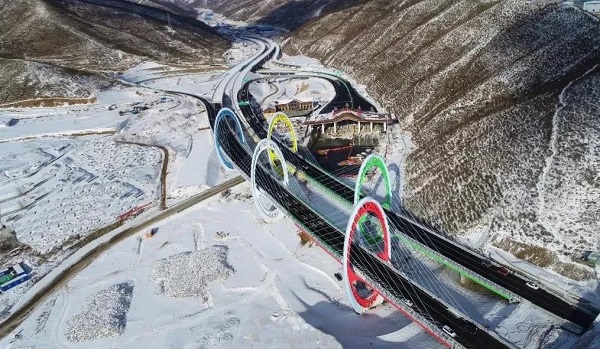CCCC Speeds up New Infrastructure Construction
In response to the COVID-19 pandemic, China Communications Construction Company Limited (CCCC) speeded up application of digital, intelligent and informatized technologies to support pandemic prevention and control.
It was, undoubtedly, a trigger to a faster development pace of new infrastructure such as 5G, artificial intelligence, industrial internet and the internet of things.
New infrastructure was proposed at the Central Economic Work Conference in 2018. Accelerating 5G commercial use and strengthening new infrastructure construction of artificial intelligence, industrial internet and the internet of things were also included.
Later, it was said at the 2019 Government Work Report to "further develop next-generation information infrastructure".
A while back in April, speeding up infrastructure of 5G internet and database centers was again referenced at a meeting of the Standing Committee of the Political Bureau of the CPC Central Committee.
Compared with traditional infrastructure construction like railways, roads, bridges and hydropower projects, new infrastructure is based on information technology and is a key to building an era of digital economy.
The so-called new infrastructure contains seven fields, namely 5G, ultra-high voltage, new energy charging piles, big data centers, artificial intelligence and the industrial internet.
CCCC long ago made overall layout plans for new infrastructure. As early as 2002, the company started development in the rail transit field and has so far contracted more than 110 rail traffic projects in nearly 40 domestic cities, including Beijing and Shanghai.
What's more, the company is also responsible for several overseas rail traffic projects including the largest-scale subway project in Colombia and the first unmanned subway in Australia
New energy coaches and supporting charging piles are also a focus of CCCC.
In recent years, CCCC also joined in the development of smart ports based on 5G technology and the internet of things as well as artificial intelligence-based bridge design systems.
Take the smart port as an example. Zhenhua Port Machinery Company Limited of CCCC established special 5G networks for projects at Yangshan Deep-Water Port and Ningbo Zhoushan Port in 2019, which are experimental bases for application of 5G quay cranes, rail-mounted gantry crane and automatic guided vehicles.
To speed up 5G application in traditional infrastructure construction, CCCC also launched a 5G research group to help solve problems like remote control and data transmission.
Zhenhua Port Machinery Company Limited, together with China Mobile Limited, Vodafone and Huawei, released a 5G smart port white paper at a global mobile broadband forum in October 2019 which explains application of 5G technology in port automation and intelligentized renovation of ports.
A pilot road of smart highways in China, the Yanqing-Chongli highway opened to traffic on Jan 23. It is a main passage linking sports venues in Yanqing district of Beijing and Chongli of Zhangjiakou in Hebei province that will be used in the 2022 Beijing Olympic and Paralympic Winter Games; it will only take one hour to move from one district's venues to the other's.
The No.1 project of the Ministry of Transport, the highway is China's first of its kind to be equipped with a complete intelligent system, and it has already passed unmanned driving tests, according to Zhang Yan, the chief engineer responsible for the smart traffic section of China International Engineering Consulting Corporation.
Also installed along the highway are 10 sets of integrated charging cabinets and two alternating current charging piles to meet needs of coaches and other vehicles.
Generally speaking, CCCC has created applications of cutting-edge technologies in such fields as automatic ports, smart highways, smart construction sites and industrial park operation. More intelligent devices like robots for road paving, underwater work and 3D printing are expected to be used in infrastructure construction in the future.
Regarded as the "barn" in the internet era, big data centers play an indispensable role.
CCCC has built two big data centers in Xiamen of South China's Fujian province and Beijing which are now in close cooperation with operators, colleges and universities as well as equipment manufacturers. A new type of data center dedicated to maritime affairs is also in preparation.
It's worth mentioning that a consortium led by CCCC won the bid for the design, purchase and construction of the China-ASEAN (Bama) Big Data Cloud Computing Base at the end of 2019. The project will become one of the most influential large-scale green data centers in Guangxi Zhuang autonomous region.
In 2014, at the first China-ASEAN Cyber Space Forum in Nanning, capital of Guangxi, China proposed building a China-ASEAN information port and a community with a shared future in cyberspace.
Two years later, construction of the information port was fully underway.
The head of the electromechanical and intelligentization section of the big data center project said that the center will offer data services for the internet of things in countries participating in the 21st Century Maritime Silk Road.
In terms of the industrial internet, CCCC initiated research on large-scale port machinery manufacturing in the entire industrial chain and built a technical security frame of smart industrial internet equipment in March 2019 to create a system of manufacturing and maintenance of smart port machines.
CCCC will continue to promote its role in new infrastructure construction and increase research and application of innovative technologies to serve the country's high-quality economic and social development.

The Yanqing-Chongli highway, linking Yanqing district of Beijing and Chongli in Zhangjiakou of Hebei province, was built for the 2022 Beijing Olympic and Paralympic Winter Games. It is the first highway of its kind to be equipped with a complete intelligent system and have passed unmanned driving tests. [Photo/sasac.gov.cn]
(Executive editor: Zhang Tianyuan)



